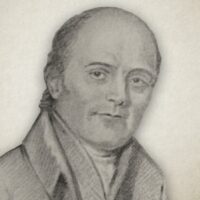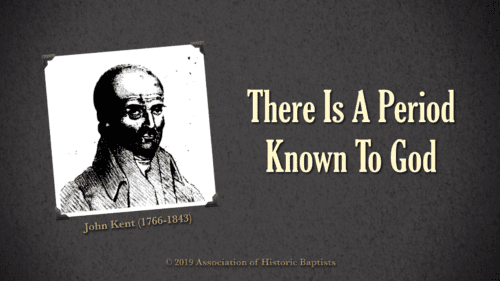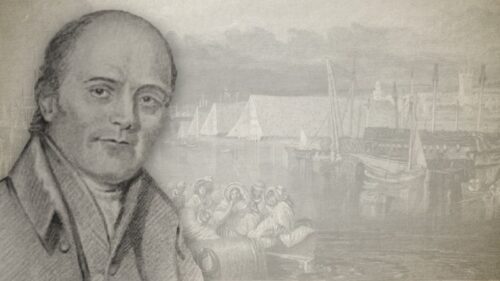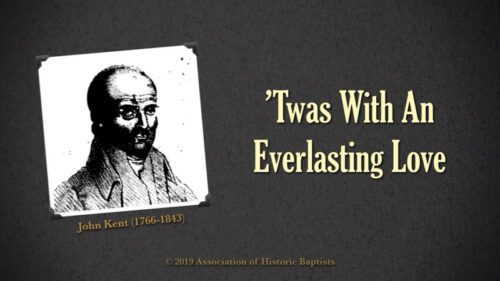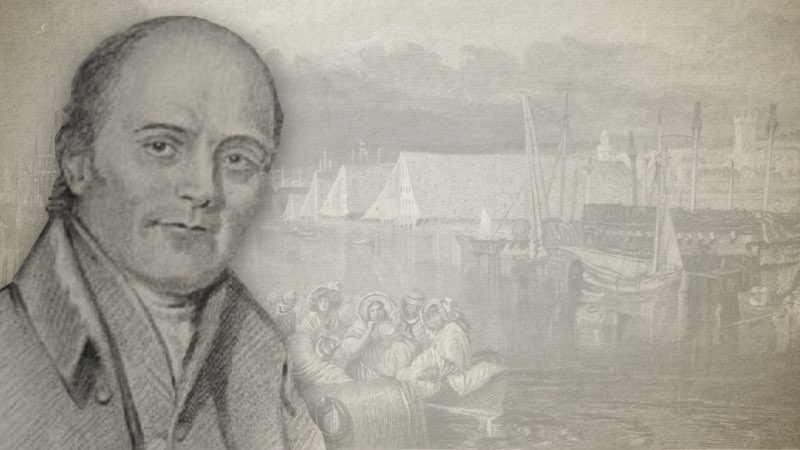
The Life And Ministry Of John Kent
The Sower 1896:
John Kent, though not a preacher of the Gospel, was one who had a rich and gracious experience of the power of the truth as it is in Jesus, and was able by his pen to write most gloriously of the grand distinguishing truths of God’s electing love, Covenant favour, sovereign grace, the safety and security of God’s chosen. He loved to set them forth in opposition to error, as picking up the lost, guilty, ruined sons of Adam from the lowest depths of the Fall, and placing them among the beloved sons and daughters of the Lord Almighty. The atoning blood and justifying obedience of Christ were themes on which he delighted to dwell.
He is chiefly known amongst us now by his many precious hymns and poems which live in our midst. He numbered amongst his most attached and bosom friends Dr. Hawker, Henry Fowler, Thomas Hardy, John Andrew Jones, and many others of a kindred spirit, whose names and memory carry a sweet savour with them. Some of these wrote highly recommendatory prefaces to his hymns, and assisted in their publication, as his means did not allow him to do it himself, moving as he did in a humble sphere of life; and he in his turn honoured those whom he survived, such as Dr. Hawker and Henry Fowler, with poetic elegies on their deaths.
He was born at Bideford, in Devonshire, December, 1766. His parents, though poor, were of the household of faith, and for many years enjoyed the holy ministrations of Samuel Lavington, a true Gospel pastor. They had a large family, for whom they had to labour hard for the bread that perisheth, and also laboured in prayer and instruction that their offspring might be manifested as children of God; and they were happy in receiving gracious answers to their prayers, as several of them were early called to know the Lord, amongst them John, the youngest, the subject of this sketch. His father being a shipwright by trade, and obtaining employment in the Royal Arsenal at Plymouth Dock, necessitated the removal of the family there. And soon after, when John was about fourteen years of age, he was apprenticed with his father. Not having the advantages of education, and having a thirst for knowledge, he employed his leisure hours in improving himself in this respect, and the Lord also, while he was but a youth, began to work upon his heart, for he says:—
“Early in life it pleased my God,
Who rules the world without control,
To send an arrow dipped in blood,
That pierced me to the very soul.
“Convictions seized my bread, while I strove by prayers to calm the troubled sea; fond of my own doings, I struggled hard, and fought shard against the sovereignty of God with high rebellion. I said, ‘Can the ever-blessed God His Jacob love and Esau hate?’ And, turn which way I would, prickling briars and thorns hedged up my way, until mine eyes were turned to Jesus, whose precious blood bore the curse and my sins away. Often do I think of that memorable day when my soul, by precious faith, arose as on eagles’ wings from the pit of miry clay and I rejoiced in the free salvation of God, realizing my own personal interest therein.”
For more than fifty years he walked as a humble Christian before his God, a lover of good men (while Mr. J. C. Philpot was in the Church of England, in 1831, he writes, “I heard Fowler preach at the little ‘Refuge’ in Deal. Old John Kent, the author of ‘Gospel Hymns,’ was there, and I had the pleasure of shaking hands with him”), and his attachment to the fundamental doctrines of the Cross was preserved through the whole of his long life. He laboured in the Dockyard, writing his hymns in his leisure hours, until the Lord was pleased to afflict him with blindness; and even after this he composed many by dictation, his little grandson being his amanuensis. When about sixty-five years of age he writes thus:—
“‘Tis with me a day of small things indeed; the gold has become dim, and the salt has apparently lost its savour; but blessed be His Name, which is able to make all grace abound towards me; yea, that He waits to be gracious, that He has said, ‘I will be as the dew unto Israel.’ Before they call, He has promised to answer; and while they are yet speaking, He has said, ‘I will hear.’ Oh may He come and put His hand a second time to the work, and strengthen those things that are ready to die. I am all wants, wounds, and wretchedness; but to whom shall I go but to Him, who not only hath the words of eternal life, but who is the Way, the Truth, and the Life itself, the Hope of Israel, and the Saviour thereof in the time of trouble? I find every day brings its cross with it, and we should do well to expect it. The waters of Marah are still bitter waters. I find bitters in the world, bitters in the Church, and bitters in the family; but though I thus write, I am persuaded that in the end they often prove to be cross-handed blessings, sent in love. God is dealing with me according to Covenant, and will make crooked things straight and rough places plain. The vision is for an appointed season; in the end it shall speak and not lie, and He that shall come according to the decree will come according to His promise, and will not tarry.
“Then shall I see in that diviner light,
What here I can but faintly, dimly see,
That all the way my God has led was right,
And e’en the roughest was the best for me.
“The milk and honey lie beyond the wilderness, and in the promise there is a sweet harvest home. All odds will then be made even, all knots will then be untied, and the most crooked paths that the traveller to Zion ever trod will be as straight as the bonds of everlasting love could make it. I cannot see the end of the dispensation; I draw wrong conclusions, and say as Joseph did when the patriarch Jacob blessed his sons, ‘Not so, my Father,’ but the Scripture tells us that ‘he crossed his hands wittingly.'”
In the year 1840 the Lord was pleased to remove his eldest daughter suddenly, and not long after his beloved partner in life, to whom he had been united more than fifty years. These heavy strokes told upon his aged frame, yet his mind was raised to things above, as he sweetly writes in 1842: “Through mercy I enjoy more of the blessings of health than might have been expected at the age of seventy-five years, but I have to be ashamed of my ingratitude and forgetfulness, for mercy and goodness have followed me all the days of my life. I feel the old tabernacle falling into decay, and every day tells me that I shall shortly put it off, and go down to the silent chamber of the tomb. I bless God for a good hope beyond it. He has overcome the last enemy, even death, and him that had the power of death, which is the devil, and consecrated the grave as a subterraneous passage to glory, and given us in the Gospel a sure pledge of that inheritance which is incorruptible and undefiled, and cannot fade away. The grapes of Canaan were to Israel a token of the goodly land beyond the swellings of Jordan. It was a saying of good old Rutherford, ‘I want not to love the breast more than the nurse.’ If you have not seen his Letters, I recommend them as a sweet morsel. Since I last wrote, it has pleased my heavenly Father to remove from me the partner of my joys and sorrows. She has entered, I hope, into her eternal rest, having, as she told me just before her death, committed both body and soul into the hands of her dear Redeemer.”
For some years he had suffered from a painful disorder, for the relief of which he underwent a surgical operation; and when told, after the second or third trial, by the surgeon that there was no hope, he exclaimed, “Thou art a Covenant God, Thy word is never forfeited.”
“From Pisgah’s top, to faith revealed,
I see the promised land;
The milk-white stone my pardon seals,
‘Tis’ graved by God’s own hand.”
From this time the symptoms of dissolution showed themselves more formidable, and to everyone it was apparent that the end was near. Addressing his niece, who was in attendance upon him, he said, “My hopes are fixed upon the Rock of Ages.” Upon his son reading to him the twenty-seventh Psalm, he observed how it agreed with the whole of his experience. Wishing to be raised up, and a friend offering to take him in his arms, he consented, saying at the same time, ”I am in better arms,” repeating immediately—
“The arms of everlasting love
Beneath my soul He placed,
And on the Rock of Ages set
My slippery footsteps fast.”
His sufferings being very great, he said to those around him, “The consolations of the Gospel afford me support and shelter under all, for we must all appear before the judgment seat of Christ, to give an account of the deeds done in the body.” He remarked, “If I stand there alone, I am lost for ever, but this is my hope; it is the judgment seat of Christ, and He has become my Surety, paying all demands. I shall be tried there by a covenant of grace, not by a covenant of works. Blessed be God for His great salvation. ‘It is a faithful saying, and worthy of all acceptation, that Christ Jesus came into the world to save sinners, of whom I am chief.’ Ah! it is worthy of all acceptation. I’ll bless Him, and I’ll praise Him too, inasmuch as the promise of the Covenant met me in all my wants, wounds, and wretchedness. I wish to die with ‘God be merciful to me a sinner’ upon my lips.”
Two old companions came to bid him farewell, to whom, with much warmth and feeling, he said, “I would not be without Christ for a thousand worlds. If I had a thousand tongues, I would speak well of His name. My frames and feelings are not the condition of my acceptance. No! Blessed be God, salvation is all of grace from first to last.”
Every cord of the feeble tabernacle now seemed loosened by the severe pains, and when his medical attendant informed him it would soon be all over, “Yes,” he said, “and that is a consoling thought—
“For weary saints a rest remains
In heaven from all their toils and pains;
When seas of joy eternal flow,
Without a taint of mortal woe.”
He called his son to him, put his arms around his neck for the last time to commend him to God and the word of His grace, praying that His blessing might be upon his children and his children’s children, through the infinite grace of Hirn who has redeemed him, the God of his salvation. From this time he spoke but little, but from the movement of his hands and lips appeared to be in communion with God. The last words he uttered while entering Jordan’s chilling waters were, ”I am accepted, I accepted!” and so he passed over, November 15th, 1843, aged seventy-seven years. He was interred in Stoke Damerel churchyard, near Devonport, where a neat stone has been erected, 1878, to his memory, by a lover of his hymns, which, besides the inscription, &c., has his own verse—
“What cheering words are these,
Their sweetness who can tell?
In time and to eternal days,
‘Tis with the righteous well.”
John Kent (1766-1743) was an English hymn writer. Having been apprenticed to his father, he became a ship-builder. Residing in Plymouth, near the dockyard, they were members of the Barrack-Street Baptist church. It was for this congregation Kent’s hymns were compiled and published. Fifty-one of his hymns are included in William Gadsby’s Selection of Hymns, which is not surprising since Kent was an ardent believer in high views of sovereign grace.



